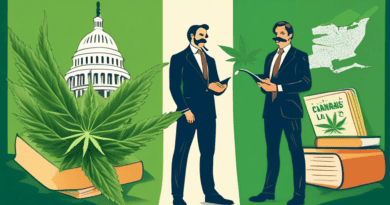Force Majeure and Frustration of Purpose in the Age of COVID-19
Cannabis companies and especially cannabis retailers need to understand the concepts of force majeure and frustration of purpose when dealing with landlords and suppliers in this recent age of COVID.
A coronavirus pandemic (or even the threat of such a pandemic) could easily make it more difficult for parties to perform their obligations under many types of contracts—especially contracts requiring travel or involving the delivery of goods and services and commercial leases.
In the event that one of the parties to a contract can’t perform as a result of an actual or potential coronavirus outbreak, would the doctrine of force majeure allow them to suspend their performance or terminate the contract or lease?
Do Contractual Force Majeure Provisions Apply to COVID-19?
In most commercial contracts, one or more contractual provisions will specifically address the parties’ rights in the event of a so-called “force majeure” event. Whether a party can be excused from a contract on account of force majeure is a fact-specific determination that will depend on the nature of the party’s obligations and the specific provisions of the contract. More specifically, in the context of a coronavirus outbreak, the parties’ obligations will depend on, among other factors:
- the extent to which the parties’ contract provides for suspension of performance (or termination of the contract altogether) as a result of force majeure;
- the factors that the contract requires must be considered in determining whether a force majeure event has occurred;
- the extent to which the outbreak actually prevented the party asserting force majeure from performing; and
- whether the party asserting force majeure had the ability to mitigate the effects of the pandemic and its ability to perform under the contract.
Parties seeking to assert force majeure should also carefully review their contracts to determine whether any specific notices are required to be delivered to the other party—and whether there are time limits that apply to the ability to give notice of a force majeure event.
Do Commercial Lease Force Majeuere Provisions Apply to COVID-19?
Force majeure clauses in leases typically provide that a party’s performance of its obligations under the lease may be delayed or suspended due to unforeseen circumstances beyond such party’s control. In evaluating whether the specific force majeure clause in the lease is applicable, the parties need to consider whether COVID-19 qualifies as a force majeure event.
The specific language in the lease is important as force majeure provisions are typically interpreted narrowly by courts so that only the events listed or substantially similar to the events listed will be covered. If a force majeure clause does not expressly include pandemics, epidemics, disease or substantially similar words, it is likely that disputes will arise as to whether the force majeure clause applies to COVID-19 under more general terms such as an “act of God” and governmental action. The determination depends on the specific language in the lease, the particular facts of each case (for example, whether the business is essential or nonessential) and the applicable law of the jurisdiction.
Even if COVID-19 qualifies as a force majeure event under the lease, typical force majeure clauses only apply to performance obligations and operational covenants under the lease such as construction, opening, and continuous operation requirements as well as service, repair and maintenance obligations. Force majeure clauses often expressly provide that it will not excuse a tenant’s obligation to pay rent regardless of the occurrence of a force majeure event.
Some Contracts Don’t Contain Force Majeure Provisions
If a contract or lease does not contain a force majeure provision—or if an event falls short of triggering a contractual force majeure provision—the parties may need to consider whether the doctrine of “frustration of purpose” applies. That doctrine can excuse a party from performing a contract if:
- the subject matter of the contract or the means of performance have been destroyed, making it impossible for the party to perform; or
- the central purpose of the contract has been frustrated by an event that the parties could not have reasonably anticipated at the time they entered into the contract.
It can be difficult to prove a frustration of purpose, however, and courts will typically not allow the parties to overcome the language of their contract by asserting frustration of purpose.
Moreover, when the parties entered into the contract will play a crucial role in determining whether a potential or actual coronavirus pandemic constitutes a frustration of purpose. Those parties who entered into contracts before December of 2019 may have an easier time proving frustration of purpose because they had no reason to anticipate a pandemic occurring just two-to-three months later. By contrast, if parties enter into a contract after the likelihood of a pandemic became apparent, then it will be much more challenging for either party to argue that the impacts of the pandemic could not have been reasonably anticipated at the time of contracting. In other words, given the escalating news and other reports surrounding the potential for a coronavirus pandemic, at what point did a pandemic become reasonably foreseeable? That question may become the subject of significant debate and case law in the near future.
Know Your Contractual Notice Requirements
The parties must also make sure to comply with any notice requirements in the force majeure clause. For example, the force majeure clause may provide that the party invoking the clause must provide written notice to the other party within a certain number of days after the force majeure event occurs. It is important to comply with the notice requirement in a timely manner to avoid the risk that force majeure is not available because of a party’s failure to comply with the notice requirement.
Practical Steps for Lease Holders
Given the unprecedented nature of the COVID-19 pandemic, it is unclear how courts will apply force majeure clauses to current leases or contracts as each case will be fact specific. Both landlords and tenants need to consider both the legal issues as well as the business issues in determining how to proceed. In most instances, it will be in the best interest of both parties to reach an agreement to allow the tenant to continue to operate its business and to continue the lease, which agreement may require rent abatement and/or rent deferral solutions. In almost all cases, landlords will not benefit if a tenant is forced to go out of business because any legal proceedings will take time and it is likely that the landlord will experience difficulty in back-filling the space. The following are a few practical step for the parties to take as they consider their options:
- Review the existing lease to determine whether COVID-19 qualifies as a force majeure event, if there are any limitations on the applicability of the force majeure provision with respect to any specific operational covenants under the lease and comply with any notice and deadline requirements.
- Communicate with the other party to discuss potential delays and impacts on the business operations of the parties to develop a creative solution that allows the tenant to remain in business and continue the lease. The parties should also determine whether there is any business interruption insurance coverage and/or available government stimulus programs.
- Review loan documents, as well as any subordination, non-disturbance and attornment agreements, to determine whether the lender’s consent is required in connection with any lease amendments or early termination agreements.
- As part of any future lease negotiations, the parties should make sure that pandemics and government-mandated shutdowns are expressly considered in the force majeure provision and consider whether there should be any rent abatement and/or termination rights if a pandemic, government-mandated shutdown or similar event occurs in the future.
The right to assert force majeure is typically governed by the provisions of the parties’ agreement. Whether a potential or actual coronavirus pandemic is a force majeure event will typically depend on the language of those provisions, as well as the extent to which the coronavirus made a party’s performance impossible—as opposed to merely delaying it or making it more expensive. Another potential factor is when the parties entered into the contract or lease vis-à-vis when the impact of the coronavirus on the construction industry and larger economy became reasonably foreseeable. Because every deal and every project is unique, we recommend consulting with an attorney to help evaluate these factors under the applicable contract.




